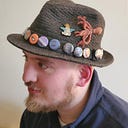Member-only story
Users develop craft — incredibly complicated folk-ontologies, rituals, procedures, and heuristics — for working with whatever tools they regularly use, & this craft is itself a tool. A user who identifies as ‘non-technical’ is in fact extremely technical: their desire to stay roughly within the bounds of the craft they have already developed leads them to invent incredible workarounds.
For instance, my father once was required to take a short course on Microsoft Publisher 2003. He now still does everything in Microsoft Publisher 2003, including an enormous website I help him run. His familiarity with Microsoft Publisher 2003 is deeper than many professional Java programmers’ familiarity with Java, although there are large sets of features he’s totally unaware of. Almost none of that familiarity translates to Publisher 2007.
When it comes to this kind of craft, there’s a mutual legibility problem. Programmers tend to like to extend themselves to totally new environments, so the justification for making an ugly hack in excel rather than learning R is sort of alien (though we all have encountered situations where the obvious right way to do something seems like it will require so much research that we would prefer a hack). And, on the other side, because the folk ontology of users is based on empirical experience with user interfaces that go out of their way to make internal behavior inaccessible (to ‘hide’ rather than ‘tuck away’), the concepts and terminology used by programmers is meaningfully different than those…
